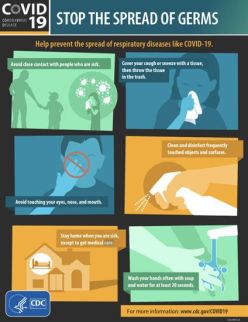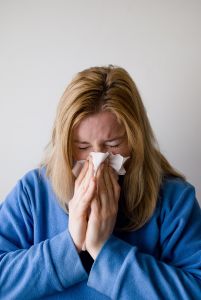With so many contagious viruses, especially major respiratory illnesses such as the coronavirus and the flu, it is important to take precautions to stay healthy. While it is important to remain calm amid increasing exposures, it is also important to know what things to look out for so that you can take care of yourself and those around you.

1. Wash your hands
According to the World Health Organization (WHO), one of the most important and easiest things that you can do to prevent the virus is washing your hands. Hand-washing should already be a daily routine and should not be something new for people. It is crucial to make sure that you wash your hands very well, especially after coming into contact with other people and objects.
“First and foremost, we should all wash our hands frequently with soap and water or alcohol-based sanitizers if soap and water are not available,” Dr. Sherry Fuller-Espie, PhD. DIC and biology professor, wrote via email.
Sue Fitzgerald, the director of student health services and member of Cabrini’s coronavirus task force, also expressed the importance of washing your hands and explained that you should wash your hands with soap and warm water for about 20-seconds. She also added that if soap and water are not available then to use alcohol-based hand sanitizer.
The Centers for Disease Control (CDC) explains that hand-sanitizer should have at least 60 percent alcohol as an alternative for when soap and water are not available.
2. Avoid touching your face
In addition to proper hand-washing, the CDC also recommends not touching your face as the mouth, nose and eyes are some of the easiest entry points for the virus to go through.
This may sound like an easy task, but people subconsciously touch their face multiple times during the day so it is important to be aware.
“…Don’t touch your eyes, your nose or your mouth,” Fitzgerald said. “If you try to do that for an hour you’re going to be surprised how hard that can be. We’re always touching our faces…”
3. Sanitize and clean commonly used objects and surfaces
It is also very important to clean off and disinfect frequently used objects and surfaces using wipes, cleaning sprays and bleach depending on the item. This kills any germs on those objects and prevents the virus from traveling.
Fuller-Espie explained that the average person comes into contact with several objects throughout the day and that those items may be a potential way to spread the virus.
“We touch many different common surfaces as we go about our daily activities including doorknobs, light switches, keyboards, desks, water fountains and others that may have been contacted by infected people who are shedding and depositing the virus on those surfaces,” she added.
The Pennsylvania Health Department and CDC also listed other items such as cell phones, tv remotes, countertops, chairs, tables, toilets, credit card, school ID’s and elevator buttons as additional objects that should be cleaned due to the frequent contact people have with these items through their hands and face.
“Common household bleach is a great product to disinfect with,” Fitzgerald said. “You just have to mix it because full-strength bleach can be dangerous.”
4. Avoid people who are sick
Another vital precaution is to avoid contact with anyone that is known to be sick. Anyone that is sick should already be avoiding contact with the public as best as possible but some people may not know they are sick or have symptoms of the virus until later. This is why it is important to follow all these guidelines because of how easily these viruses can spread through contact.
The WHO recommends maintaining at least a three-feet distance between yourself and anyone who appears to have any type of sickness through coughing or sneezing.
During this time, you should limit your handshakes, high fives, hugs and kisses with people.

5. Stay home when you are sick
Whether you just have a cold or are not feeling well, you should avoid going out and limit your interactions with others to as little as possible. If you are still feeling unwell after 24 hours then you should seek medical help.
“Individuals who are sick should stay home to minimize contact with others, and avoid contact with the most vulnerable populations including the elderly and those with certain underlying medical conditions,” Fuller-Espie wrote.
6. Maintain basic hygiene
You should continue to keep up with fundamental hygiene by covering your mouth when your cough and sneezing into a tissue or your elbow. You should throw your tissues in the trash immediately after using them.
Fitzgerald explained that you should always cough and sneeze into a tissue or your elbow but never use your hands.
“Use a tissue and make sure you throw out your own tissue,” she added. “Don’t leave tissues laying around and ask other people to throw them out.”
7. Masks are optional
At this time the CDC does not recommend wearing masks unless you are sick or working with those that are sick in medical services. If you are healthy then you are not required to wear a mask. The mask’s main purpose is to prevent airborne cough droplets from going out into the atmosphere which is why it is recommended only if you are sick.
Both Fitzgerald and Fuller-Espie explained that masks will not do much for a person in good health. Masks are not very tight against the face and still leave your eyes and other areas of your face vulnerable to viruses.
“The general public is not advised to wear face masks, and masks won’t stop the virus from entering your body because they don’t fit snugly against the skin, nor do they protect the conjunctiva of the eyes which is another portal of entry for coronaviruses,” Fuller-Espie wrote.
“It is a sensible precaution to wear a face mask if you are exhibiting respiratory symptoms to reduce aerosol droplets,” Fuller-Espie added.
Fitzgerald also explained that when healthy people stock up on masks they are potentially creating shortages for the people that need them.
Further advice from professionals
It is also important to know that you should only listen to official sources such as the Centers for Disease Control and Prevention (CDC), the World Health Organization (WHO) and the Pennsylvania Department of Health (PA DOH) concerning information about respiratory viruses like COVID-19 and the flu. Johns Hopkins is also a reliable source for more coronavirus information.
Many states along the east coast have reported their first cases this past week, including places in Pennsylvania such as Delaware County, Wayne County, Montgomery County and Monroe County according to the Pennsylvania Department of Health.
While more cases are expected, Fuller-Espie explained that although anyone can get the virus, older adults with underlying issues are more susceptible to getting the virus and are likely to be more affected by it.
“People should exercise sensible precautions during the outbreak and until the virus has been contained, but should be mindful that the vast majority of people are not at risk of contracting the COVID-19 infection,” Fuller-Espie wrote.
Student health services are open Monday through Friday from 8:30 a.m. to 4 p.m. in Founders Hall room 98. You can find more updates about the coronavirus on their page online for news about Cabrini.


